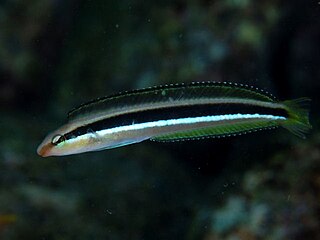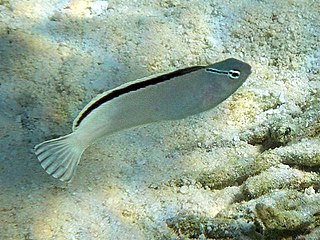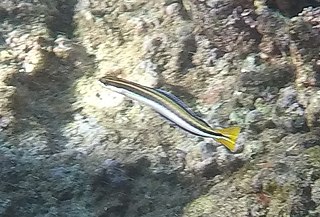Andamia reyi, the suckerlip blenny, is a species of combtooth blenny found in coral reefs in the Pacific and Indian Oceans.

Aspidontus dussumieri, the lance blenny or Dussumier's blenny, is a species of combtooth blenny found in coral reefs in the Pacific and Indian Oceans. The specific name honours the French explorer and merchant Jean-Jacques Dussumier (1792-1883).
Cirripectes springeri, Springer's blenny or the spotted eyelash blenny, is a species of combtooth blenny found in coral reefs in the western Pacific Ocean. This species reaches a length of 10 centimetres (3.9 in) TL. The specific name honours the American ichthyologist Victor G. Springer of the United States National Museum who has worked extensively on blennies.

Hypleurochilus springeri, the orange-spotted blenny, is a species of combtooth blenny found in coral reefs in the Caribbean Sea. This species grows to a length of 5 centimetres (2.0 in) TL. The specific name honours the American ichthyologist Victor G. Springer.

Istiblennius is a genus of combtooth blennies found in the Pacific and Indian Oceans. The generic name is a compound noun composed of istio the Greek for "sail", referring to the high dorsal fin of the type species, Istiblennius muelleri, and blennius which is derived from a word for "mucus" and refers to the scaleless bodies that characterise the Blenniidae.
Istiblennius muelleri, Mueller's rockskipper, is a species of combtooth blenny found in the western Pacific ocean. Males of this species can reach a maximum of 7 cm (2.8 in) SL, while females can reach a maximum of 5.5 cm (2.2 in) SL. The specific zoology honours the German-Australian physician, geographer, and botanist Ferdinand von Mueller (1825-1896).

Meiacanthus smithi, the disco blenny, is a species of combtooth blenny found in coral reefs in the eastern Indian Ocean. This species grows to a length of 8.5 centimetres (3.3 in) TL. It is also commonly known as Smith's fangblenny, Smith's sawtail blenny or Smith's harp-tail blenny. This species is also found in the aquarium trade.

Ophioblennius steindachneri, the large-banded blenny or the Panamic fanged blenny, is a species of combtooth blenny found in coral reefs in the eastern Pacific ocean. This species reaches a length of 18 centimetres (7.1 in) SL.

The longstriped blenny is a species of combtooth blenny found in the northeast Atlantic off Portugal, also known from the northern Mediterranean. This species reaches a length of 8 centimetres (3.1 in) TL. The identity of the person honoured by the specific name of this species was not specified but is thought to be the French painter and naturalist Jean Louis Florent Polydore Roux (1792-1833).

Zvonimir's blenny is a species of combtooth blenny found in the Mediterranean and Black Sea. This species reaches a length of 7 centimetres (2.8 in) TL. The identity of the person honoured in the specific name is uncertain but is thought to be the Medieval King of Croatia and Dalmatia Demetrius Zvonimir who reigned from 1075 to 1089 probably in allusion to the area where the type was collected.
Petroscirtes thepassii, the Thepas' sabretooth blenny or the Thepas' fangblenny, is a species of combtooth blenny found in the western central Pacific ocean. This species reaches a length of 5.9 centimetres (2.3 in) SL. The specific name of this blenny honours the collector of the type, the military surgeon A.H. Thepass.

Plagiotremus goslinei, the biting blenny, Gosline's fangblenny, scale-eating blenny or the scale-eating fang blenny, is a species of combtooth blenny found in coral reefs in the eastern central Pacific Ocean. This species reaches a length of 6.3 centimetres (2.5 in) SL. The specific name honours the American ichthyologist William A. Gosline (1915-2002) of the University of Hawaiʻi.
Rhabdoblennius snowi, Snow's rockskipper or the Snow blenny, is a species of combtooth blenny found in coral reefs in the Pacific ocean. This species reaches a length of 7 centimetres (2.8 in) TL. The specific name of this blenny honours the collector of the type, the missionary Benjamin Galen Snow (1817-1880).

Salarias patzneri, Patzner's blenny, is a species of combtooth blenny found in coral reefs in the western central Pacific ocean. This species can reach a length of 5.5 centimetres (2.2 in) TL. The specific name honours the Austrian ichthyologist Robert A. Patzner who worked on the genitalia of blennies and who shared specimens with Hans Bath.
Scartella springeri is a species of combtooth blenny found in the eastern Atlantic Ocean, around St. Helena. This species reaches a length of 8.2 centimetres (3.2 in) SL. The specific name honours the American ichthyologist Victor G. Springer of the U.S. National Museum.

Acanthemblemaria chaplini, the papillose blenny, is a species of chaenopsid blenny found in the western Atlantic ocean. It can reach a maximum length of 4.5 centimetres (1.8 in) TL. The specific name honours the ichthyologist Charles C. G. Chaplin (1906-1991).

Acanthemblemaria greenfieldi, the false papillose blenny, is a species of chaenopsid blenny found in coral reefs in the western Atlantic ocean. The specific name honours the American ichthyologist David W. Greenfield who identified this species a something new but gave his material to the authors.

Acanthemblemaria johnsoni, the white-cheeked blenny, is a species of chaenopsid blenny found in coral reefs around Tobago, in the western central Atlantic ocean. The specific name honours the ichthyologist G. David Johnson Curator of the Division of Fishes at the Smithsonian Institution.
Emblemariopsis bottomei, the shorthead blenny or the midnight blenny, is a species of chaenopsid blenny found in coral reefs in the western central Atlantic ocean. It can reach a maximum length of 3 centimetres (1.2 in) SL. The specific name honours Peter Bottome, although who this is, is not specified but it may possibly be the Venezuelan businessman Peter Bottome Deery (1937-2016).
Stathmonotus stahli, the eelgrass blenny or the seagrass blenny, is a species of chaenopsid blenny found in coral reefs in the western Atlantic ocean. It can reach a maximum length of 4 centimetres (1.6 in) TL. The specific name honours the Puerto Rican physician and biologist Agustín Stahl (1842-1917).












